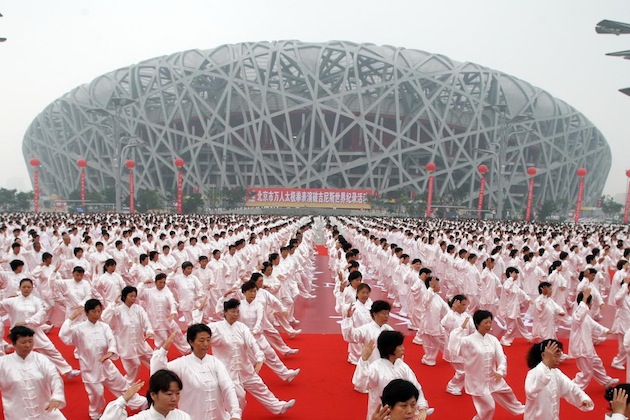
With just over a month until the Olympic games start in London, people around the world are finally getting closer to understanding the most important aspect of the event: which athletes will actually be participating. Here in the United States, some trials have already come and gone while the two most notable ones -- track and field (running June 21 - July 1 in Eugene, Oregon) and swimming (June 25 - July 2 in Omaha, Nebraska) -- are about to kick off.
Over the coming weeks we'll have a clearer picture of the story lines these Games will have and, perhaps most importantly to some, what the medal count may look like by the time the closing ceremonies roll around in August. While in the past it has often been a question of how many golds Americans will take home, the discussion has evolved much more into a look at the race between China and the United States in the overall and gold medal count.
In Beijing, the Chinese led every nation with 51 gold medals, the most since 1988 and the first time since 1936 (!) that neither the U.S. or the USSR/Russia topped the chart in that category (it should be noted America topped the overall medal count and set a new all-time mark). Some of the bump could be prescribed to the typical bounce a nation gets when hosting the Games but looking historically it's clear the world's most populous country has transformed into one of the world's athletic powerhouses.
Interactive feature: The History of the Olympic Games
 |
| China's upward trajectory in the medal count culminated in a high of 51 gold medals and 100 overall in Beijing. (IOC) |
To explain the upward trajectory, it's important to look back and note China's absence in international competition for a variety of reasons, most of which were political. With regards to the Summer Games, the country has only been in regular attendance since 1984 in Los Angeles following the establishment of the Chinese Olympic Committee in 1979. After a slight speed bump in Seoul in 1988, China has taken off and finished in the top four in the gold medal count every summer games and seen notable improvement across the board in just about every sport.
Can the trend continue in London for the Chinese? It's doubtful. A lot of the athletic development efforts the country began in the 1990's were emphasized to an even greater extent once Beijing was awarded the Games in 2001 as a means of topping the medal count on home soil. Traditional sports where the country does well in -- diving, gymnastics, table tennis, etc. -- will continue to be source of strength while success others such as track and field will come down to if a new group of athletes are ready for the international stage. Even officials at various levels are starting to downplay high expectations of living up to the enormously successful effort in 2008.
"Based on a study about the past five Games, the host country win record high medals at their home Olympics, but their medals total would drop dramatically at the next edition," Cai Zhenhua, deputy minister of China's State General Administration of Sports, told the media in April.
"Furthermore, London is not Beijing, we are no longer competing on home soil. We have to overcome the time difference, unfamiliar weather as well as logistics inconvenience. So our target for 2012 is just to remain in the lead pack on the gold medal table," he added. Capturing the most golds will still be a challenge for China even if factoring in a drop off in results by heading West this year. Before 2008, the country's previous high was 32 gold medals in Athens but that mark has been topped or equalled by the United States every year since Berlin in 1936. The British, Russians and other Europeans naturally figure to put their best foot forward this year and bump their totals up. Still, most still think the Chinese can take top honors over the U.S. and others even if it's by a narrow margin.
Capturing the most golds will still be a challenge for China even if factoring in a drop off in results by heading West this year. Before 2008, the country's previous high was 32 gold medals in Athens but that mark has been topped or equalled by the United States every year since Berlin in 1936. The British, Russians and other Europeans naturally figure to put their best foot forward this year and bump their totals up. Still, most still think the Chinese can take top honors over the U.S. and others even if it's by a narrow margin.
"From a competitive standpoint, it's going to be a close race. A lot of experts feel like the Chinese will pass us in the medal count," U.S. Olympic Committee CEO Scott Blackmun said earlier this year. "We would very much like to win the medal count. Overall and the gold medal count and the silver and bronze medal count. We would like to win as many as we can. But we can't control how well our athletes will do, only how well they prepare."
RELATED: U.S. women's teams poised for dominance in London
Ahead of a number of trials, which should give a clearer indication of how countries will do in London, USA Today projects that China will take the top spot in the overall medal count with 94 total, followed by the United States at 88 and Russia at 81 total medals. The paper thinks America edges China in the gold medal count by a 41-24 margin. Several other projections echo the same sentiment that China will grab the overall medal count while the U.S. wins the most golds.
It should be an exciting Olympic Games once again this year and as we get to know which athletes qualify for what events over the coming weeks, the story lines we'll be tracking while in London will seem to narrow. The medal count has always been something everybody from your average Joe to the President has tracked and this year it will be again with the rise of China no doubt making things much more interesting. The battle at the top in 2008 may have lent itself to where the Games were hosted but, on somewhat neutral ground, the race to win the medal count should be an exciting one this year as the Chinese look to prove that their rise is no fluke.



















